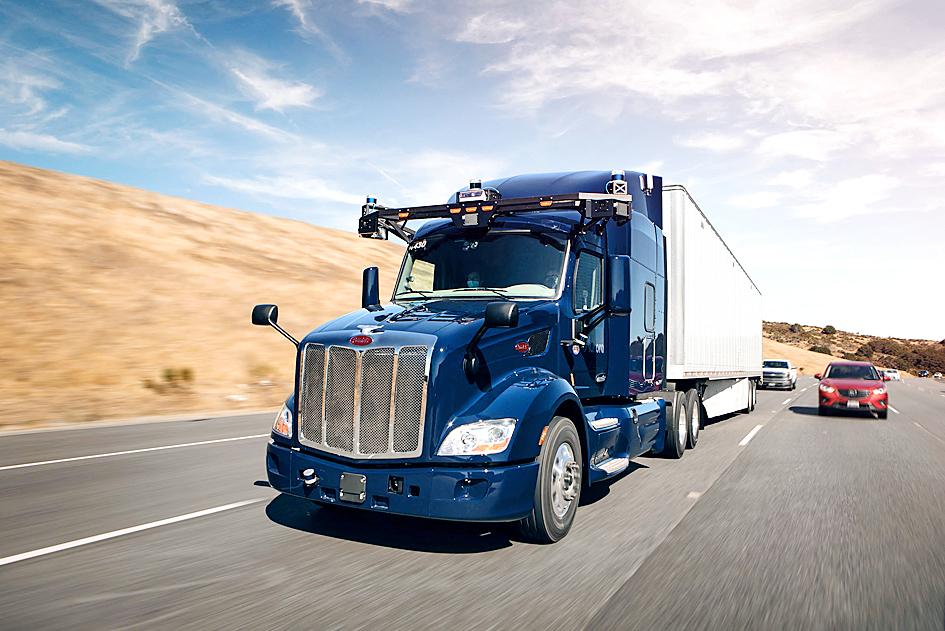-
By Francois PICARD / AFP, HOUSTON, Texas
A giant 18-wheel transport truck is barreling down a multilane Texas highway, and there is no one behind the wheel.
The futuristic idea might seem surreal, but it is being tested in the vast southern US state, which has become the epicenter of a rapidly developing self-driving vehicle industry.
However, before driverless trucks are allowed onto roads and highways, multiple tests must still be conducted to ensure they are safe.

Photo: AFP / Aurora Technologies Inc
Self-driving trucks are operated using radars, laser scanners, cameras and GPS antennas that communicate with piloting software.
“Each time we drive a mile or a kilometer in real life, we re-simulate a thousand more times on the computer by changing hundreds of parameters,” said Pierre-Francois Le Faou, trucking partner development manager at Waymo, the self-driving unit at Google’s parent company Alphabet Inc.
Waymo is building a logistics center in Dallas that would accommodate hundreds of autonomous semi-trailers. It is by far not alone. Embark, a self-driving technology start-up, operates an autonomous trucking lane between Houston and San Antonio, while Aurora, cofounded by a former Waymo employee, is to open three terminals and a new 1,000km route in Texas this year.
In a sign of how competitive the autonomous trucking industry is, none of the three companies agreed to show reporters one of its vehicles.
“I think that everybody who is in the autonomous trucking business is in Texas,” said Srikanth Saripalli, director at the Center for Autonomous Vehicles and Sensor Systems at Texas A&M University. “Even if they don’t advertise it.”
The companies did not land in Texas by chance. The state has the largest number of truck drivers and many qualified engineers, its sunny climate is great for the trucks’ sensors and neighboring Mexico exports 85 percent of its goods to Texas by road.
Houston and Dallas are major freight hubs, and Texas’s sprawling distances are ideal for long-haul transport.
However, most of all, local legislation is friendly toward driverless vehicles.
In 2018, Texas passed a law that essentially gave autonomous vehicles the same status as conventional vehicles.
“You need insurance and you need to follow the rules of the road, but other than that Texas does not impose any other regulations,” Saripalli said.
With the US so vast and trucking such a vital part of its economy, companies see self-driving as a way to cut costs and reduce risk, since unlike with human drivers autonomous vehicles do not get tired and do not require mandatory breaks.
While it would take a person three days to drive a truck from Los Angeles to Dallas, a self-driving big rig would complete the journey in 24 hours, Aurora said.
And it would be nearly twice as cheap. The per-mile (1.6km) cost would drop from US$1.76 to US$0.96 if the truck drives itself, Embark said.
Alex Rodrigues, CEO and cofounder of Embark Technology, said self-driving trucks would be crucial in combating the current shortage of long-haul truck drivers in the US, some of whom are unwilling to be away from their families for weeks at a time.
“Right now, there are containers sitting in the port of LA not getting moved,” he said.
Rodrigues promises that the self-driving truck industry would create “attractive” jobs for local drivers, who would take over the autonomous trucks at transfer points and drive them to their final destination points.
Still, 294,000 trucking jobs would be threatened by the industry’s automation, according to a 2018 study conducted by Steve Viscelli, a sociologist at the University of California, Berkeley.
For Julio Moscoso, a 56-year-old driver in Texas, the arrival of driverless trucks is “not good news.”
He said while there are many trucking jobs available right now, that was not always the case.
Most importantly, Moscoso said he would not trust driverless trucks.
“It’s dangerous. What happens if the sensors fail?” he asked.
At the same time, he admitted he does not want to do long-haul journeys anymore, and finds it uncomfortable to sleep in his cabin and not be able to shower every day.
Comments will be moderated. Keep comments relevant to the article. Remarks containing abusive and obscene language, personal attacks of any kind or promotion will be removed and the user banned. Final decision will be at the discretion of the Taipei Times.

